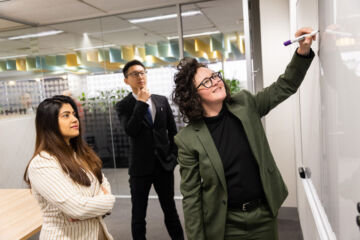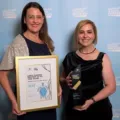Co-design like it suggests is grounded in the belief that all people have creative capacity, experience and expertise that can helpfully inform the direction and design of an eLearning solution. This creative collaboration offers an opportunity to thoughtfully design a project with
your organisation rather than for it.
What is a co-design workshop?
A co-design workshop is a discovery day that brings together implementing partners with the organisations stakeholders to work through the design process and eLearning objectives.
At eWorks, our co-design workshops are an opportunity to bring everyone together in a deeply collaborative process that explores the eLearning process from start to finish. Our co-design workshops are part of our established end-to-end quality approach where we work with organisations from the initial concept through to the deployment of a final eLearning program.
Why should you run a co-design workshop?
Co-design workshops are a hands-on approach to eLearning course development. By bringing together users, designers, researchers, and stakeholders from your organisation; the co-design workshop can yield strong idea generation and create participatory design.
The best times to run a co-design workshop or co-design session is towards the end of the initial discovery phase when you have some research but are still unclear of which direction to move forward in or what solution to pursue. A co-design workshop is like a bridge between an idea and a protype.
7 tips for co-design workshop success
- Be Prepared Before you hold a co-design workshop, it’s important to determine an objective for the workshop to work towards. For example: why is there a high failure rate for the surgeons exam? Take your objective and conduct some preliminary research like interviews to give some insights into why a problem exists, as well as some ideas for solving the core problem faced by users, in this case, students taking the exam. It’s about bringing forth the pain points and associated emotions so that a user-focussed solution can be implemented.
- Warm up and set the tone Start your co-design workshop with something to warm up the room, a classic icebreaker to get each member of the room to share something about themselves. It should also include a loose agenda of the session as well as any ground rules to keep every on task.
- Ask ‘why’? Asking why helps get to the part of the problem. It can help you build on existing research, generate, and validate ideas, and tests both existing solutions and new ideas. Asking why can also help understand why someone does or doesn’t like what is being discussed, helping to add to your insights.
- Avoid decision-making The main objective of a co-design workshop is to hear from different perspectives to create the best outcome for the end user. It is an idea generating forum to test creativity and create knowledge and insights that will be used later to inform decision-making.
- Keep it snappy The ideal length of time for a co-design workshop is to limit it to around 3 hours, plus breaks, to avoid participant fatigue. It’s also useful to split large groups of participants into smaller groups to work most collaboratively throughout the session and present their work at the end of the session.
- Use a range of visual methods Co-design workshops should be a highly tactile and visual experience. Whether you use whiteboards for storyboarding of content mapping, or you are making collages or modelling, the activities should be truly ‘hands-on’ to get the most out of your workshop participants.
- Use de-personalised language Language can make a huge impact on your workshop outcomes. Using collective nouns like ‘people’ or ‘users’ instead of ‘you’ or ‘we’ can help participants think more objectively about the user problems you are trying to solve.
Go with the eLearning experts
At eWorks we work with you from your initial concept right through to the design, review, test, development, and deployment stages. With over 25 years of industry experience in eLearning and running co-design workshops, we work with you through participatory design to achieve the best outcome for your organisation.
Looking to collaborate on your future eLearning needs for your team? Get in touch today



